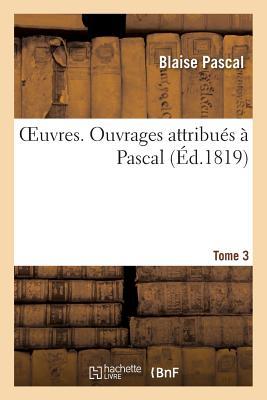- Biblia
- Leer la Biblia
- Versiones de la Biblia
- Verso del dia
- Planes de lectura
- Versos por tema
- Books of the Bible
- Imágenes De La Biblia
- Estudio
- Comentarios
- Concordancias
- Diccionarios bíblicos
- Enciclopedias bíblicas
- Sermones
- Bible Atlas & Maps
- BP Wiki
- Devocionales
- Devocionales de hoy
- Light of the World
- Todos los devocionales
- Inspirational Quotes
- Más
- Picture Quotes
- Videos
- Inspirador
- Estudio Bíblico
- Lo que dice la Biblia
- Bible Q&As
- Daily Bread
- Bible by Genre
- Bible Stories
- Random Bible Verse
- Comunidad
- Store
Oeuvres. Tome 3
by Blaise Pascal
Oeuvres de Blaise Pascal. Ouvrages attribuA(c)s A Pascal / . Nouvelle A(c)dition
Date de l'A(c)dition originale: 1819
Ce livre est la reproduction fidA]le d'une oeuvre publiA(c)e avant 1920 et fait partie d'une collection de livres rA(c)imprimA(c)s A la demande A(c)ditA(c)e par Hachette Livre, dans le cadre d'un partenariat avec la BibliothA]que nationale de France, offrant l'opportunitA(c) d'accA(c)der A des ouvrages anciens et souvent rares issus des fonds patrimoniaux de la BnF.
Les oeuvres faisant partie de cette collection ont A(c)tA(c) numA(c)risA(c)es par la BnF et sont prA(c)sentes sur Gallica, sa bibliothA]que numA(c)rique.
En entreprenant de redonner vie A ces ouvrages au travers d'une collection de livres rA(c)imprimA(c)s A la demande, nous leur donnons la possibilitA(c) de rencontrer un public A(c)largi et participons A la transmission de connaissances et de savoirs parfois difficilement accessibles.
Nous avons cherchA(c) A concilier la reproduction fidA]le d'un livre ancien A partir de sa version numA(c)risA(c)e avec le souci d'un confort de lecture optimal. Nous espA(c)rons que les ouvrages de cette nouvelle collection vous apporteront entiA]re satisfaction.
Pour plus d'informations, rendez-vous sur www.hachettebnf.frwww.hachettebnf.fr
Date de l'A(c)dition originale: 1819
Ce livre est la reproduction fidA]le d'une oeuvre publiA(c)e avant 1920 et fait partie d'une collection de livres rA(c)imprimA(c)s A la demande A(c)ditA(c)e par Hachette Livre, dans le cadre d'un partenariat avec la BibliothA]que nationale de France, offrant l'opportunitA(c) d'accA(c)der A des ouvrages anciens et souvent rares issus des fonds patrimoniaux de la BnF.
Les oeuvres faisant partie de cette collection ont A(c)tA(c) numA(c)risA(c)es par la BnF et sont prA(c)sentes sur Gallica, sa bibliothA]que numA(c)rique.
En entreprenant de redonner vie A ces ouvrages au travers d'une collection de livres rA(c)imprimA(c)s A la demande, nous leur donnons la possibilitA(c) de rencontrer un public A(c)largi et participons A la transmission de connaissances et de savoirs parfois difficilement accessibles.
Nous avons cherchA(c) A concilier la reproduction fidA]le d'un livre ancien A partir de sa version numA(c)risA(c)e avec le souci d'un confort de lecture optimal. Nous espA(c)rons que les ouvrages de cette nouvelle collection vous apporteront entiA]re satisfaction.
Pour plus d'informations, rendez-vous sur www.hachettebnf.frwww.hachettebnf.fr
BUY NOW
Paperback
Published September 19th 2016 by Hachette Livre Bnf
Suscribir
© 2026 Bibleportal.com Reservados todos los derechos.

Among the contemporaries of Descartes none displayed greater natural genius than Pascal, but his mathematical reputation rests more on what he might have done than on what he actually effected, as during a considerable part of his life he deemed it his duty to devote his whole time to religious exercises.
At 16, Pascal began designing a calculating machine, which he finally perfected when he was thirty, the pascaline, a beautiful handcrafted box about fourteen by five by three inches. The first accurate mechanical calculator was born.
Pascal was dismayed and disgusted by society's reactions to his machine and completely renounced his interest in science an mathematics, devoting the rest of his life to God. He is best known for his collection of spiritual essays, Les Pensees.
Ironically, Pascal, who was a genius by any measure, with one of the finest brains of all time, died of a brain hemorrhage at the age of 39.
Among the contemporaries of Descartes none displayed greater natural genius than Pascal, but his mathematical reputation rests more on what he might have done than on what he actually effected, as during a considerable part of his life he deemed it his duty to devote his whole time to religious exercises.
He was a child prodigy who was educated by his father, a Tax Collector in Rouen. Pascal's earliest work was in the natural and applied sciences where he made important contributions to the study of fluids, and clarified the concepts of pressure and vacuum by generalizing the work of Evangelista Torricelli.
In 1646, he and his sister Jacqueline identified with the religious movement within Catholicism known by its detractors as Jansenism. Following a mystical experience in late 1654, he had his "second conversion", abandoned his scientific work, and devoted himself to philosophy and theology. His two most famous works date from this period: the Lettres provinciales and the Pensees.
In honor of his scientific contributions, the name Pascal has been given to the SI unit of pressure, to a programming language, and Pascal's law (an important principle of hydrostatics), and as mentioned above, Pascal's triangle and Pascal's wager still bear his name.
... Show more